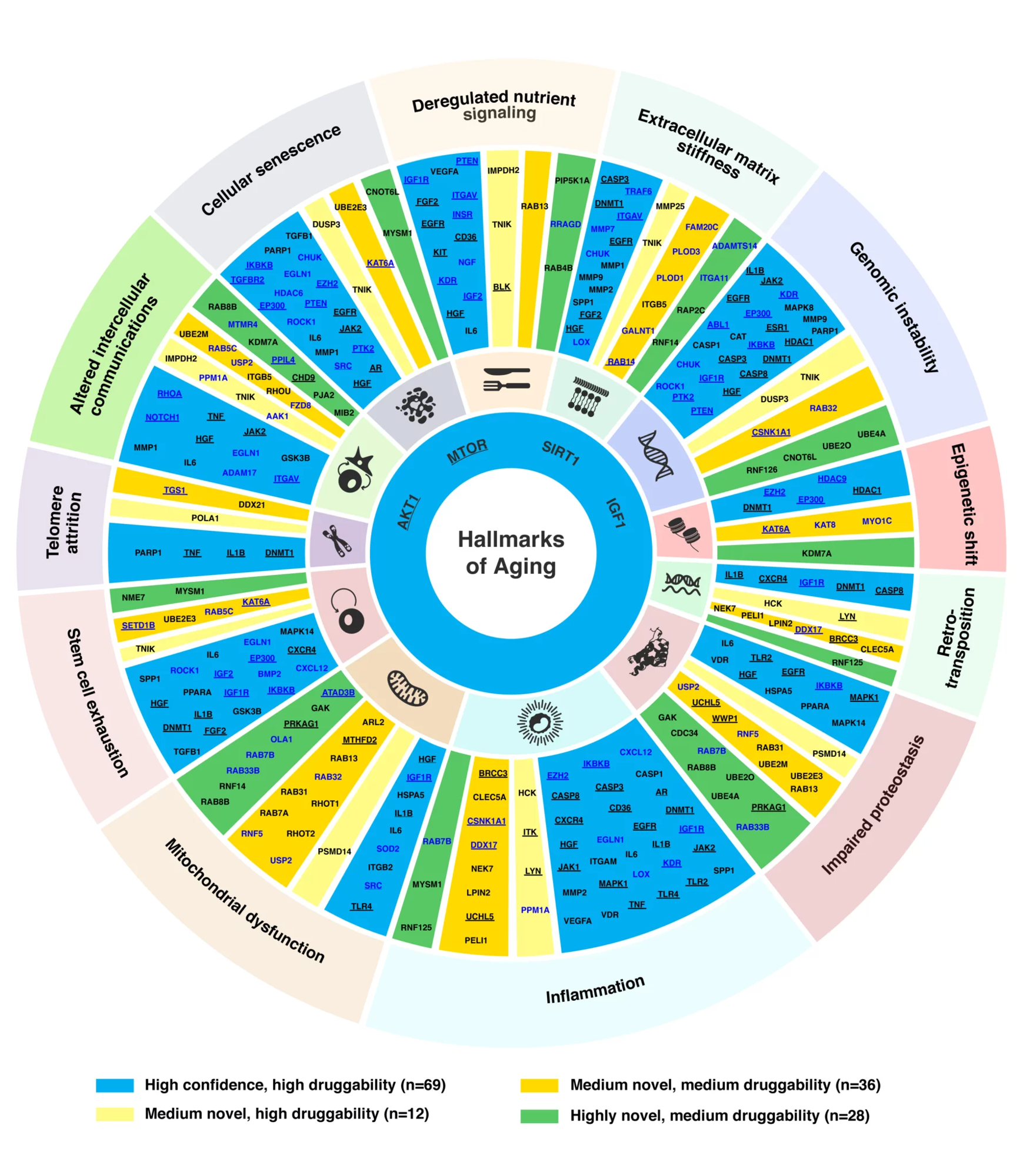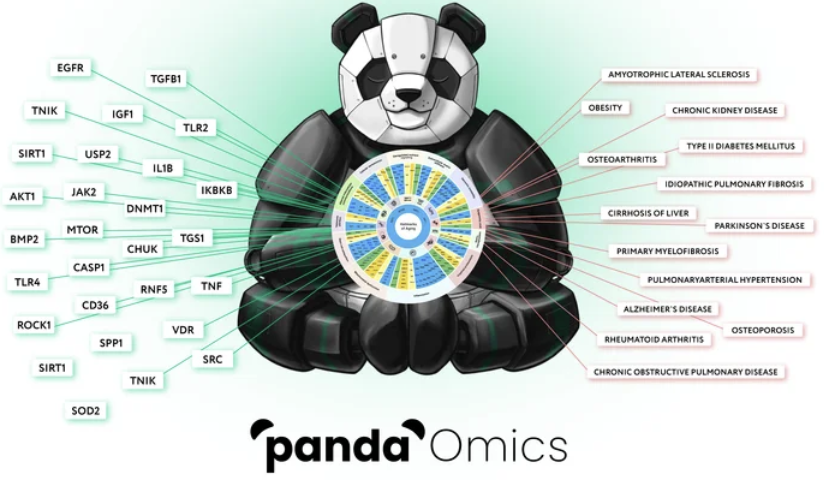Aging and disease are closely linked. Cardiovascular diseases, cancer, diabetes, and neurogenerative disorders are all driven by aging, but drug development has been slow at connecting the dots. Older patients are poorly represented in clinical trials and drugs are developed to target disease irrespective of age. One of the challenges of our time is to better understand how aging and disease are linked and to develop drugs that address both.
The over-60 population is the fastest-growing segment of the population in developed countries and it is expected to increase to over 2 billion by 2050, so it is not surprising that age-related diseases are on the rise. Heart disease is the leading cause of death for men and women in the United States.

Image Credit: Insilico Medicine
Neurodegenerative diseases like Alzheimer’s and Parkinson’s affect millions of people. 6.2 million in the U.S. have Alzheimer’s and the likelihood goes up exponentially with age. Moreover, the American Diabetes Association reports that the number of Americans with diagnosed diabetes is projected to increase 165%, from 11 million in 2000 (prevalence of 4.0%) to 29 million in 2050 (prevalence of 7.2%), in part due to the aging population.
What are the current measures used to address these illnesses, and where are they considered insufficient?
As traditional drug discovery research has not considered the role of aging in these diseases, targets for treating these diseases have often been overlooked. If we consider Alzheimer’s disease, there are drugs that can lessen symptoms, but none that can stop the cognitive decline or truly treat the disease. There are numerous efforts underway to find a treatment - utilizing the immune system, reducing inflammation, and understanding the connection between the brain and heart.
Artificial intelligence is able to recognize patterns and find targets that humans overlook - identifying overlooked connections between aging and disease.
Can you give an overview of how you and your team at Insilico have attempted to tackle aging and age-related diseases?
Insilico Medicine has developed an end-to-end AI-driven drug discovery platform called Pharma.AI that draws on trillions of data points in order to identify potential targets for new drugs (PandaOmics) and design new small molecules that can bind to those targets (Chemistry42). The third piece of our platform which will be launched at the BIO Convention in San Diego this week uses AI for clinical trial prediction, called IncClinico. In addition, we just announced that Insilico Medicine will be launching an AI-run robotics lab (run by our AI software) that will perform experiments and generate additional data.
Insilico uses aging as a key biomarker in its software - our AI system looks for the overlap between aging and disease across a variety of measures and finds targets that address both.
How can AI help identify potential targets for the treatment of age-related illnesses?
The target discovery portion of our platform, called PandaOmics, can quickly process massive amounts of data to identify new drug targets. PandaOmics uses 1.9 trillion data points drawn from over 10 million samples (microarrays, RNA sequencing, proteomes) and over 40 million documents (patents, grants, publications, clinical trial reports).
How can understanding the biology of aging help tackle these diseases and what is the role of AI in this?
As we understand the biological mechanisms driving aging, we see the ways that aging and disease are closely linked, and are able to identify targets that slow or even reverse disease and the aging process simultaneously. There are nine classic hallmarks of aging: genomic instability, telomere attrition, epigenetic alterations, loss of proteostasis, deregulated nutrient sensing, mitochondrial dysfunction, cellular senescence, stem cell exhaustion, and altered intercellular communication.
By using our AI target discovery platform, PandaOmics, we were able to discover novel aging-associated targets most of which play a role in inflammation and extracellular matrix stiffness.
The AI is able to sift through massive amounts of data to find patterns and make connections with speed and efficiency across multiple disease areas.
How does the identification of dual-purpose targets not only for specific disorders but across multiple types of diseases help clinicians in developing therapies?
The idea of dual-purpose drugs to treat both disease and aging offers exciting possibilities for future treatment. The idea is to develop drugs with an incredibly beneficial side effect - that of slowing the aging process itself, contributing to longer, healthier lives for patients.
What is the PandaOmics platform, and how was it used in this study?
PandaOmics is a sophisticated AI software platform that relies on trillions of data points including omics data, grants, clinical trials, compounds and biologics, patents and publications. The AI algorithms can suggest hypotheses of novel drug targets in minutes. First, PandaOmics converts seemingly unrelated genes into a connected story using a proprietary pathway analysis approach and then uses AI algorithms to analyze the data and find hidden connections.

Image Credit: Insilico Medicine
How does this AI-enabled platform compare to conventional methods of identification?
Traditional drug discovery is hampered by years-long research and development, high cost and high failure rates. It takes over 10 years and costs around $2 billion to bring one drug to market — and around 90% of drug candidates fail during human trials.
AI brings speed and efficiency to the process, accelerating the expertise of human scientists.
With our lead drug candidate, for idiopathic pulmonary fibrosis, we went from AI target discovery to AI novel drug design to Phase 1 clinical trials in under 30 months. A typical timeline for a preclinical candidate is 3-6 years and $430 m; we went to preclinical candidate in 18 months for $2.6 m. This ultimately means we have the opportunity to identify and produce new drugs at a rate that can get treatments to patients in need faster and at a lower cost. Since 2021, we have announced 8 new preclinical candidates. We have announced two for cancer and one for COVID-19 in just the past couple of months.
What were the significant findings of the study?
In under 2 months, Insilico used its AI software platform PandaOmics to identify 145 aging-related therapeutic targets across various age-related diseases like Alzheimer’s, Parkinson’s, and osteoarthritis. These were further narrowed down into 9 highly promising therapeutic targets. These targets are related to inflammation and fibrosis, neurodegeneration, kidney disease, arthritis, and Alzheimer’s disease.
Were any of your findings surprising to you and the team?
We were confident that we could discover dual-purpose targets for aging and disease but were nonetheless surprised to have found so many - 145 - in such a short time frame - under two months.
What is next for this research?
Now biologists and clinicians can take this research further and investigate the therapeutic potential of these targets.
After the success of your initial study, what are the next steps for your research, and what partners do you hope will accompany you on this journey?
Insilico Medicine has 30 therapeutic programs in our internal pipeline, including in cancer, COVID-19, and inflammatory diseases, that we are progressing to IND-enabling studies. We also licence our technology to pharma companies to accelerate their drug discovery programs. The company has multi-asset partnerships with Fosun Pharma and Cambridge-based EQRx. The partnership with Fosun has already borne fruit in the form of a preclinical candidate for cancer nominated less than 40 days since the partnership began.
About Alex Zhavoronkov
 Alex Zhavoronkov, Ph.D., is the founder and CEO of Insilico Medicine (insilico.com), a leader in next-generation artificial intelligence technologies for drug discovery, biomarker development. He is also the founder and CEO of Deep Longevity, Inc, a global company developing a broad range of artificial intelligence-based biomarkers of aging and longevity. Since 2015 he invented critical technologies in the field of generative adversarial networks (GANs) and reinforcement learning (RL) for generation of the novel molecular structures with the desired properties and generation of synthetic biological and patient data. He also pioneered the applications of deep learning technologies for prediction of human biological age using multiple data types, transfer learning from aging into disease, target identification, and signaling pathway modeling.
Alex Zhavoronkov, Ph.D., is the founder and CEO of Insilico Medicine (insilico.com), a leader in next-generation artificial intelligence technologies for drug discovery, biomarker development. He is also the founder and CEO of Deep Longevity, Inc, a global company developing a broad range of artificial intelligence-based biomarkers of aging and longevity. Since 2015 he invented critical technologies in the field of generative adversarial networks (GANs) and reinforcement learning (RL) for generation of the novel molecular structures with the desired properties and generation of synthetic biological and patient data. He also pioneered the applications of deep learning technologies for prediction of human biological age using multiple data types, transfer learning from aging into disease, target identification, and signaling pathway modeling.
Under his leadership Insilico raised over $50 million in multiple rounds from expert investors, opened R&D centers in 6 countries and regions, and partnered with multiple pharmaceutical, biotechnology, and academic institutions. Prior to founding Insilico, he worked in senior roles at ATI Technologies (acquired by AMD in 2006), NeuroG Neuroinformatics, Biogerontology Research Foundation. Since 2012 he published over 130 peer-reviewed research papers, and 2 books including “The Ageless Generation: How Biomedical Advances Will Transform the Global Economy” (Palgrave Macmillan, 2013).
He serves on the editorial boards of Aging Research Reviews, Aging, Trends in Molecular Medicine, Frontiers in Genetics, and founded and co-chairs the Annual Aging Research, Drug Discovery and AI Forum (8th annual in 2021) the world's largest event on aging in the pharmaceutical industry. He is the adjunct professor of artificial intelligence at the Buck Institute for Research on Aging.
Disclaimer: The views expressed here are those of the interviewee and do not necessarily represent the views of AZoM.com Limited (T/A) AZoNetwork, the owner and operator of this website. This disclaimer forms part of the Terms and Conditions of use of this website.